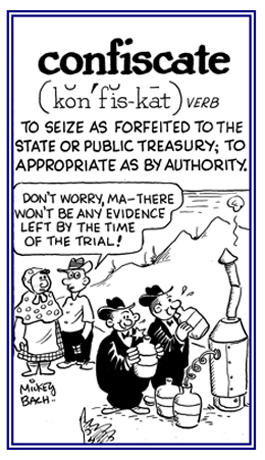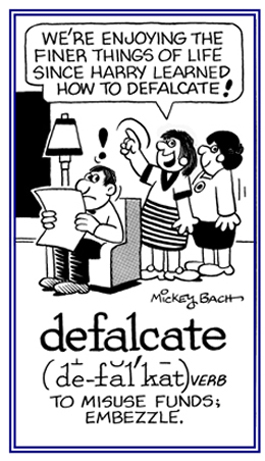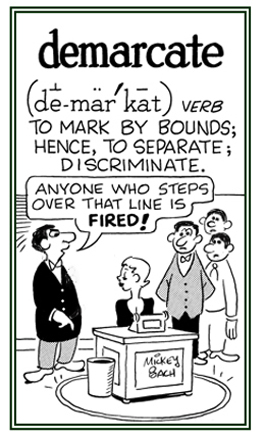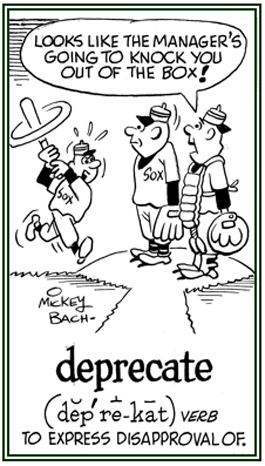-cate
(This suffix has no etymological source; it is just a part of other words.)
complicate (KAHM pli kayte") (verb), complicates; complicated; complicating
1. To make something more difficult or less simple to do: Mark woke up late, and to complicate matters further, his train did not arrive on schedule and so he couldn't get to work on time.
2. To cause a situation to become more dangerous or harder to treat: The doctor warned Carol that her illness would be complicated by the infection that had just developed.

© ALL rights are reserved.
Go to this Word A Day Revisited Index
2. To cause a situation to become more dangerous or harder to treat: The doctor warned Carol that her illness would be complicated by the infection that had just developed.

Go to this Word A Day Revisited Index
so you can see more of Mickey Bach's cartoons.
conduplicate
confiscate (KAHN fi skayt") (verb), confiscates; confiscated; confiscating
1. To seize property legally forfeited to the public treasury as a penalty for some illegal activity: The custom's officials were confiscating illegal goods that were being brought into their country by truck.
2. Having had property taken away legally or by forfeiture: While being in the foreign country, Monika’s camera was confiscated by the police because she was taking pictures of the paintings in the museum, which was against the law.
3. A governmental act of seizing someone's assets without payment or to take a person's private property for public use without reasonable compensation: The government agents confiscated a woman's new car because she had used it to illegally transport contraband cigarettes and cigars.
4. Etymology: from the 1550s, originally, "to appropriate for the treasury"; from Latin confiscatus, the past participle of confiscare, from com-, "together" + fiscus, "public treasury"; literally, "money basket".

© ALL rights are reserved.
Go to this Word A Day Revisited Index
2. Having had property taken away legally or by forfeiture: While being in the foreign country, Monika’s camera was confiscated by the police because she was taking pictures of the paintings in the museum, which was against the law.
3. A governmental act of seizing someone's assets without payment or to take a person's private property for public use without reasonable compensation: The government agents confiscated a woman's new car because she had used it to illegally transport contraband cigarettes and cigars.
4. Etymology: from the 1550s, originally, "to appropriate for the treasury"; from Latin confiscatus, the past participle of confiscare, from com-, "together" + fiscus, "public treasury"; literally, "money basket".

Go to this Word A Day Revisited Index
so you can see more of Mickey Bach's cartoons.
contraindicate (verb), contraindicates; contraindicated; contraindicating
1. To suggest the inadvisability of something; for example, a medical treatment: Certain medications are contraindicated during pregnancy because of the danger they can pose for the unborn baby.
2. To make a treatment or procedure unacceptable because of a particular condition or circumstance: Some specific exercises in the fitness studio are contraindicated for people with heart problems.
3. Etymology: from Latin contra, "against" + indicere, "to proclaim" from Latin indicare, "to declare, to dictate".
2. To make a treatment or procedure unacceptable because of a particular condition or circumstance: Some specific exercises in the fitness studio are contraindicated for people with heart problems.
3. Etymology: from Latin contra, "against" + indicere, "to proclaim" from Latin indicare, "to declare, to dictate".
coruscate (KOHR uh skayt") (verb), coruscates; coruscated; coruscating
1. To give forth flashes of bright light which sparkle and glitter: Jack presented Janice with a diamond ring that was coruscating in the candlelight when they were dining out while celebrating their engagement to get married.
2. To exhibit sparkling virtuosity with lively skill or technique when doing something; such as, a musical performance: The little nine-year old singer in the talent show sang an opera that coruscated throughout international TV and is still coruscating on the internet.
2. To exhibit sparkling virtuosity with lively skill or technique when doing something; such as, a musical performance: The little nine-year old singer in the talent show sang an opera that coruscated throughout international TV and is still coruscating on the internet.
decorticate (dee KOHR ti kayt") (verb), decorticates; decorticated; decorticating
1. In botany, to remove the outer layer of a plant: To decorticate vegetation involves the removal of bark, rind, or the husks.
2. To surgically disconnect the surface layer, membrane, or fibrous cover of a body organ or structure: In this case, the surgeon may decorticate body parts of the kidney, the scar tissue of the lungs, or the cortex of the brain from the underlying white part in order to improve their functions.
3. Etymology: from Latin decorticare; from de-, "off" + cortex, "bark, rind".
decorticate (dee KOHR ti kit") (adjective), more decorticate, most decorticate
2. To surgically disconnect the surface layer, membrane, or fibrous cover of a body organ or structure: In this case, the surgeon may decorticate body parts of the kidney, the scar tissue of the lungs, or the cortex of the brain from the underlying white part in order to improve their functions.
3. Etymology: from Latin decorticare; from de-, "off" + cortex, "bark, rind".
decorticate (dee KOHR ti kit") (adjective), more decorticate, most decorticate
Relating to a brain that has lost the function of its cerebral cortex as a result of a disease or surgery.
The functions of the "cerebral cortex" include the perception of sensations, learning, reasoning, and memory.
dedicate (verb), dedicates; dedicated; dedicating
1. To give up earnestly, seriously, or wholly, to a particular person or specific purpose: The orchestra dedicated all of their evenings practicing their new compositions for the concert.
2. To inscribe or to address a book, an engraving, a piece of music, etc. to a patron or a friend, as a compliment or a mark of honor or affection: Joy Fielding dedicated her book Heart Stopper to Shannon Micol, a person whose music inspired her very much.
3. To set aside, to specify, or to preserve for a specific purpose: The money that the city received was dedicated to building a much-needed bridge.
4. To open formally to the public; to inaugurate or to make public: The children played baseball in the city park which was recently dedicated by the mayor.
5. Etymology: from de-, "utterly, completely" and dicare, "to proclaim, to tell, to say".
2. To inscribe or to address a book, an engraving, a piece of music, etc. to a patron or a friend, as a compliment or a mark of honor or affection: Joy Fielding dedicated her book Heart Stopper to Shannon Micol, a person whose music inspired her very much.
3. To set aside, to specify, or to preserve for a specific purpose: The money that the city received was dedicated to building a much-needed bridge.
4. To open formally to the public; to inaugurate or to make public: The children played baseball in the city park which was recently dedicated by the mayor.
5. Etymology: from de-, "utterly, completely" and dicare, "to proclaim, to tell, to say".
defalcate (di FAHL kayt"; DEF uhl kayt") (verb), defalcates; defalcated; defalcating
To steal, to misuse, or to embezzle money by someone who is supposed to be taking care of an organization's or other people's funds: The newspaper in Karan's town revealed how the mayor was defalcating expenses from the city's resources to build himself a luxurious home.

© ALL rights are reserved.
Go to this Word A Day Revisited Index

Go to this Word A Day Revisited Index
so you can see more of Mickey Bach's cartoons.
delicate (DEL i kit) (adjective), more delicate, most delicate
1. Pleasing in its lightness, mildness, subtlety, etc. (a delicate flavor, odor, color, etc.); fine, dainty, exquisite, elegant: The queen wore a long gown of delicate silk.
2. Easily damaged, spoiled, fragile, frail, perishable; dainty: The plate was so delicate that Irene was afraid to wash it.
3. Frail, feeble, debilitated, weakened; infirm, unwell, sickly, ailing: Jim was concerned about his wife's delicate physical condition.
4. Palatable, savory, delicious, appetizing, luscious: The hostess presented a tray of delicate food to her guests.
5. Soft, muted, subdued: Jerry had the walls of his bedroom painted with a delicate blue.
6. Exquisite, minute, detailed: David's friend admired the delicate workmanship on the bronze doors."
7. Tactful, tasteful, diplomatic, careful, sensitive, refined: The salesman handled the customer's complaint in a delicate manner.
2. Easily damaged, spoiled, fragile, frail, perishable; dainty: The plate was so delicate that Irene was afraid to wash it.
3. Frail, feeble, debilitated, weakened; infirm, unwell, sickly, ailing: Jim was concerned about his wife's delicate physical condition.
4. Palatable, savory, delicious, appetizing, luscious: The hostess presented a tray of delicate food to her guests.
5. Soft, muted, subdued: Jerry had the walls of his bedroom painted with a delicate blue.
6. Exquisite, minute, detailed: David's friend admired the delicate workmanship on the bronze doors."
7. Tactful, tasteful, diplomatic, careful, sensitive, refined: The salesman handled the customer's complaint in a delicate manner.
demarcate (verb), demarcates; demarcated; demarcating
To set and to mark the limits or boundaries of something: The idea that James and Jane had of building a new house had been undetermined until they were able to demarcate some land, then their desire became a reality.

© ALL rights are reserved.
Go to this Word A Day Revisited Index

Go to this Word A Day Revisited Index
so you can see more of Mickey Bach's cartoons.
dephlogisticate
To relieve of inflammation.
deprecate (DEP ri kayt") (verb), deprecates; deprecated; deprecating
1. To protest, to express strong disapproval of, or to make a condemnation of something or somebody: The city spokesman deprecates the use of violence as done by some demonstrators.

© ALL rights are reserved.
Go to this Word A Day Revisited Index
The townspeople deprecated the new exhibit at the art museum because it was so negative about religions.
2. To belittle, to deplore: Everett, you should not deprecate your own worth to the community because you have done so much to help homeless people.There are many who deprecate the use of public money for what they consider to be nonessential purposes.
3. Etymology: from Latin de-, "away" + precari "to pray, to request" from which we also get pray and prayer. Originally, it meant "to pray for deliverance from something unfavorable".
Go to this Word A Day Revisited Index
so you can see more of Mickey Bach's cartoons.
desiccate (DES i kayt") (verb), desiccates; desiccated, desiccating
1. To dry up; to preserve by drying or depriving of moisture; especially, to dry completely: The surgeon removed a suspect mole and thoroughly desiccated the tissue around that area with a needle electrode.
2. To preserve food by drying or dehydrating it: While baking a cake, Elizabeth used a cup of desiccated coconut.
2. To preserve food by drying or dehydrating it: While baking a cake, Elizabeth used a cup of desiccated coconut.
It is a common practice to desiccate apricots.
3. Etymology: from Latin desiccare, "to dry up".
detoxicate (dee TAHK si kayt") (verb), detoxicates; detoxicated; detoxicating
1. To remove poisonous substances or to transform them into something harmless: Jeff’s nose was bothering him so much because he couldn’t breath properly and so the doctor gave him some special nose drops in order to detoxicate the tissues which were posing his breathing problems.
2. To treat an alcoholic or drug addict by using a controlled withdrawal of the addictive substance: Greg, who drank too much wine and beer, was strongly encouraged by his friends to have himself detoxicated in a special hospital.
2. To treat an alcoholic or drug addict by using a controlled withdrawal of the addictive substance: Greg, who drank too much wine and beer, was strongly encouraged by his friends to have himself detoxicated in a special hospital.
devellicate (verb), devellicates; devellicated; devellicating
1. To pull into pieces.
2. To detach, to rip apart.
2. To detach, to rip apart.


